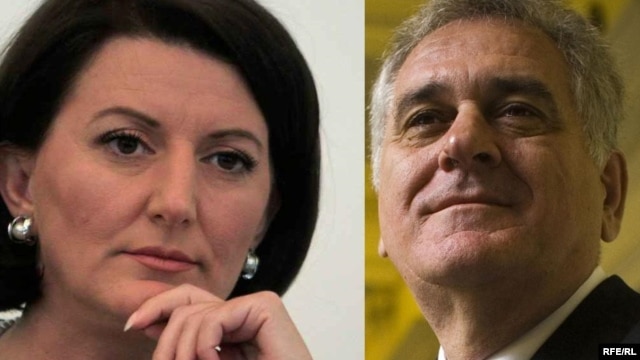Kosovar, Serbian presidents to discuss 'normalization'
| Publisher | Radio Free Europe/Radio Liberty |
| Publication Date | 5 February 2013 |
| Cite as | Radio Free Europe/Radio Liberty, Kosovar, Serbian presidents to discuss 'normalization', 5 February 2013, available at: https://www.refworld.org/docid/512235ba1e.html [accessed 2 June 2023] |
| Disclaimer | This is not a UNHCR publication. UNHCR is not responsible for, nor does it necessarily endorse, its content. Any views expressed are solely those of the author or publisher and do not necessarily reflect those of UNHCR, the United Nations or its Member States. |
Last updated (GMT/UTC): 05.02.2013 11:54
By RFE/RL's Balkan Service
 Kosovar President Atifete Jahjaga (left) and Serbian President Tomislav Nikolic will meet on February 6.
Kosovar President Atifete Jahjaga (left) and Serbian President Tomislav Nikolic will meet on February 6.
PRISTINA – Kosovar President Atifete Jahjaga tells RFE/RL that she and Serbian President Tomislav Nikolic will discuss the normalization of bilateral relations when they meet on February 6.
The meeting in Brussels under the auspices of the European Union is the first between Kosovar and Serbian presidents.
In an interview on February 5 with RFE/RL, Jahjaga expressed hope the meeting would contribute to better relations between the two neighbors.
"This meeting is symbolic but also an important one, because this is a first meeting between the presidents of the Republic of Kosovo and Republic of Serbia, which is considered as a success for normalization and the advancement of relations of two sovereign and independent countries," she said.
"We will support the ongoing EU facilitated dialogue led by the prime ministers of our countries, a process which is strongly supported by the United States"
Jahjaga said the summit, arranged by the European Union's foreign-policy chief, Catherine Ashton, could be the beginning of a more specific dialogue.
"The main goal of this meeting is to find solutions for all the issues, with full consent, by respecting European norms and standards as well as international conventions," Jahjaga said. "Taking into consideration our [war] past and relations between Kosovo and Serbia, [the international community] utterly expects us to entirely normalize our relations. The presidents' meeting has this aim in particular, whereas the government of Kosovo is authorized by parliament to lead the dialogue process."
Jahjaga did not say whether any agreement would be signed.
She reaffirmed that the recognition of Kosovo's independence would bring stability to the region and added that Serbia and Kosovo can support each other in their EU integration efforts.
Mostly ethnic Albanian Kosovo declared independence from Serbia in 2008. Most of the international community, including the United States and a large majority of the EU's 27 member states, have recognized Kosovo's independence.
Serbia, however, has refused to acknowledge Kosovo's statehood. Serbia's traditional ally, Russia, and Belgrade's neighbor, EU member Romania, have also not granted recognition.
Serbs in Kosovo's northern enclave also refuse to accept Pristina's authority.
Link to original story on RFE/RL website
